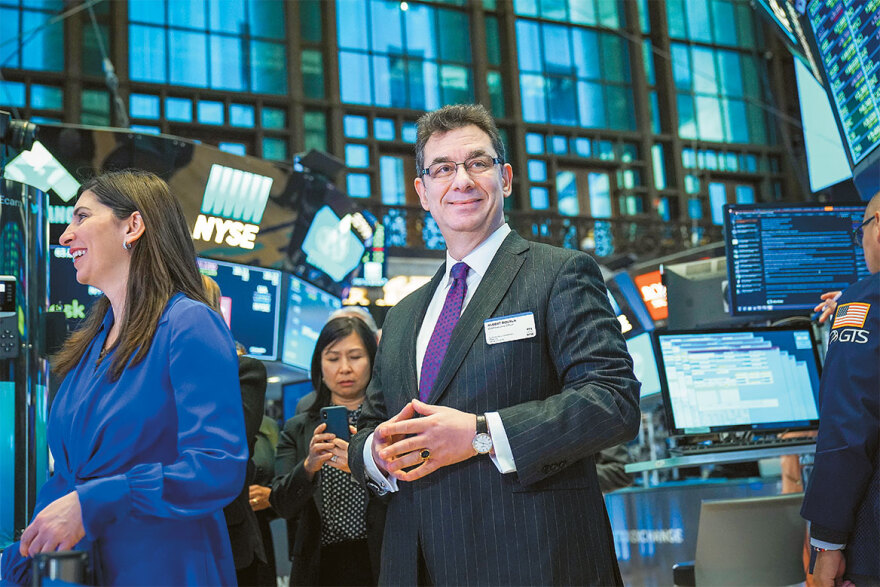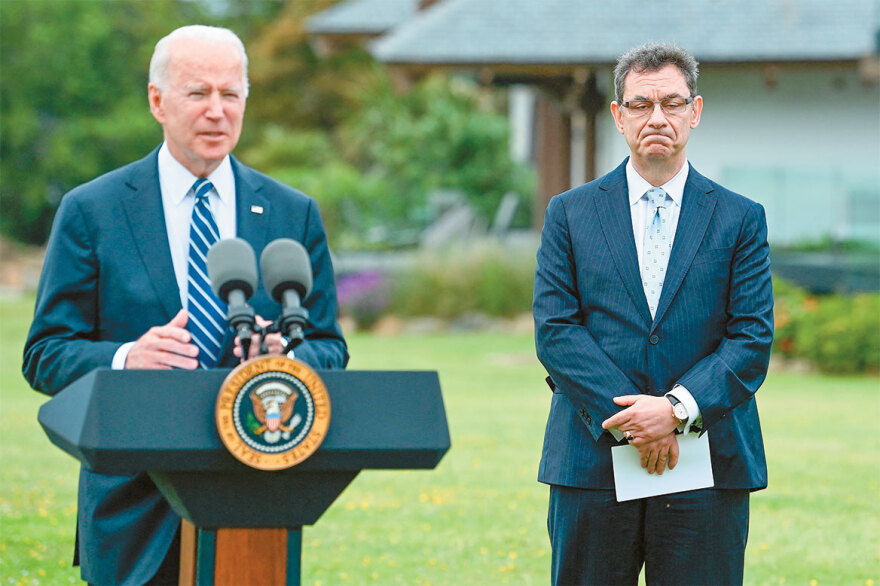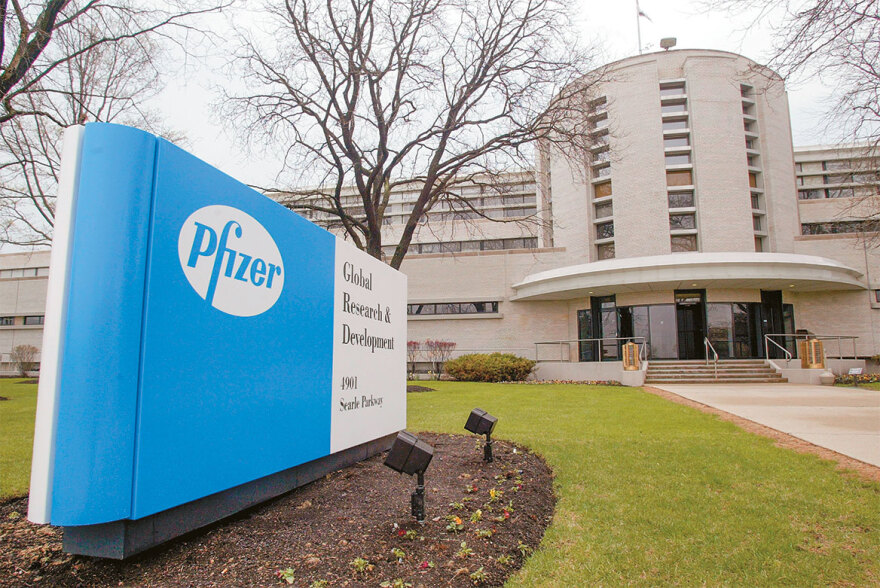Albert Bourla linked Pfizer‘s name with the containment effort of the COVID-19 pandemic and this is the piece of history that belongs to him definitively, objectively and beyond any objection or reservation. But in an extremely competitive and ever-evolving field like that of the pharmaceutical industry, each success only counts as a precursor to the next. If at the present stage Pfizer is not, for example, a leader in the field of Ozempic-type slimming preparations, it is of little if any encyclopaedic significance that it was a pioneer in the production of vaccines for coronavirus a few years ago.
And as far as Mr. Bourla personally is concerned, the chairman and CEO of Pfizer since 2019, a multi-millionaire (his current annual earnings are $21.5 million) who has been the CEO of Pfizer since 2019. dollars) who travels around the globe in a private jet, yesterday’s hero could very easily become today’s culprit of lag and failure, the scapegoat.
His future, for the first time in his illustrious 31-year career at Pfizer, now hinges on his answer to a seemingly simple question: how is it that Pfizer during a pandemic had $40 billion in revenue and today has lost $20 billion of its market value? So unless he provides a reasonable and convincing explanation, his demise seems a realistic and entirely possible possibility.

The Fund
His current enemies are representatives of Starboard Value, a US investment fund management firm that a few weeks ago acquired a stake in Pfizer for $1 billion, and they want his head. And they are determined to get it. From their point of view, it matters not at all that thanks to Mr. Bourla’s strategic moves, which were the right ones at exactly the right time, Pfizer was first of any of its competitors to find itself in an extremely advantageous position.
It invented, tested and manufactured billions of doses of the most sought-after vaccine in modern human history. In addition, shortly thereafter the vaccine was accompanied by the Paxlovid pill, also for COVID-19. Obviously, the profits Pfizer reaped from the marketing of the coronavirus drugs were directly commensurate with their quantities.
He himself, a 63-year-old doctor of veterinary medicine from Thessaloniki, a descendant of Holocaust survivors, completely unknown to the general public before the pandemic, suddenly became universally famous. His persona as the charismatic CEO of Pfizer, one of the world’s largest pharmaceutical companies, was almost heroic – and not unfairly so. Of course, his fame was matched by the real power of his influence, since all the world’s political leaders, without exception, were obliged to negotiate the purchase of vaccines for their people with him.
A small indication of how important his role in the international political arena was and remains is the case of the messages exchanged with him in 2021 by European Commission President Ursula von der Leyen regarding the procurement of vaccines for the EU.
According to some, the terms of the deal are surrounded by a taint of opacity or even scandal. Indeed, this “Pfizergate” has caused intense friction in von der Leyen’s election campaign ahead of her renewal of her term as Commission president. And the key factor in the case was once again Mr Bourla.
The responsibility of triumph
In a term borrowed from basketball, Mr. Bourla is the undisputed MVP of the pandemic. The most valuable player in the battle against the demonic and insidious coronavirus. The spreadsheets showing Pfizer’s profitability in the midst of the pandemic crisis were enough to stun anyone who would dare criticize his handling. However, what was unthinkable until recently has already begun to unfold: in short, his removal is required. Starboard Value’s officials are firing at him relentlessly and mercilessly, using a weapon that usually proves irresistible: numbers and financial results.
Thus, Mr. Bourla, who – by oversimplifying at least – defeated the coronavirus, now faces the ultimate battle of professional survival against an even more dangerous adversary, the dry accounting evaluation of his choices as CEO.
The same man who had the foresight and audacity to invest billions of dollars in the German company BioNTech and mRNA biotech is now being asked to apologize to the company’s shareholders to present convincing excuses, a recovery plan and so on for Pfizer’s all-too-real stock market slide. After all, Starboard Value has disbursed USD 1 billion to acquire a sufficient stake in Pfizer and will go to extremes to protect its investment. Even if it means ousting the current CEO.
The irony of fate for Mr Bourla lies in the paradox that the triumph he achieved – by all accounts always – over the coronavirus was not the end and solemn crowning glory of the race, but merely its starting point. For Pfizer automatically set itself even higher goals, even greater challenges for the immediate future, to which its chief executive had to respond just as effectively as he had with the COVID-19 vaccine. But the actual numbers show that the scenario unfolding at Pfizer in the post-pandemic period is far from ideal and expected for its shareholders, such as Starboard Value.
This negative picture of Pfizer’s financial performance, outlook, and generally its valuation from an investment perspective is reflected as clearly as possible in its share price, which is currently lower compared to 2019, despite the gains accumulated during COVID-19. And Mr. Bourla is, by definition, the first accountable for this unfavorable outcome.

The indictment
At this time, the board of directors of the company expresses its full support for Mr. Bourla and rejects the harsh criticism leveled against him by Starboard Value officials. As for him, although he has so far not publicly stated his own view on Pfizer’s performance, and while a meeting with angry Starboard Value decision-makers is pending, the company’s books show that on his own initiative and already since 2020, nearly $70 billion has been invested in acquisitions of smaller advanced and niche biotech companies, most notably in the case of Seagen.
Pfizer brought it into its group for $43.4 billion, with the expectation that Seagen’s research into various forms of cancer was so advanced that it would make it possible to produce therapeutics rapidly. In practice, however, it turned out that Seagen would take longer than originally predicted, which postponed the manufacture of drugs into the distant future – but unfortunately also Pfizer’s profitability, the consequent rise in its Wall Street share price, etc. Also, since the COVID-19 vaccine, Pfizer seems to have no similar commitment to any particular disease or sector.
Instead, Mr. Bourla’s investment policy seems fragmented and unclear, with acquisitions of companies ranging from cancer treatment to blood disorders to neuroscience, etc.
Of course, his biggest problem at the moment is the fierce attack he is under from Starboard Value. Its executives have included in 74 pages of a PowerPoint file everything that could weigh down Mr Bourla’s position and make it precarious – if not impossible – for him to remain at the top of Pfizer. This document is an X-ray of his record from the perspective of a strategic investor like Starboard Value.
The presentation starts with the undeniable achievements, as it puts forward the assessment that “under Bourla’s leadership, Pfizer was the first pharmaceutical company in the world to succeed in bringing a vaccine to the real market, as well as an oral drug, Paxlovid, for the treatment of COVID-19.”
On the next page, Starboard Value weaves the two-fer to Pfizer and personally to “Dr” Bourla, as it addresses him, in a celebratory tone: “We applaud the outstanding contribution of the company and Dr. Bourla in ending the pandemic. We believe that their contribution was colossal’, etc. Behind the praise, however, there is a staging, a dramatic economy: first the exaltation, then the demolition. But to execute the scenario of the final deconstruction, the Starboard Value executives cite some important financial figures. They point out, for example, that Pfizer’s liquidity due to the COVID-19 vaccine shot up from $8 billion in 2020 to $40 billion in 2021 and 2022 combined.
Nevertheless, the relevant chart shows that Pfizer’s performance has been “dramatically underperforming” the competition, as tracked by the major stock market indices. The result is that its value has declined by $20-60 billion over the last 6 years. More specifically, the price for each Pfizer share on 12/31/2018 was $41.38 and on 4/10/2024 it had fallen to $28.58 with a depreciation of nearly 31%.
About failures
Starboard Value’s analysis distinguishes four axes of missteps on the part of Pfizer. It is understood that all are attributed to Bourla and relate to: a) the lack of innovation internally, within the company itself, between 2019-2023; b) the absence of notable future innovations; c) the management of available capital and investments in acquisitions of other companies in the industry; d) Pfizer’s future projections and budget.
The first section of its fatal flaws, according to Starboard Value, includes several drugs which, while presented as innovative and favorites to bring in huge profits for the company, ultimately disappointed. Either because their sales fell short of predictions or, even worse, because they never made it past the testing stage before mass production.
Starboard Value ruled that Pfizer failed with Ibrance for breast cancer, dermatological Cibinqo, Litfulo for the treatment of severe pollen alopecia, Rivipansel for sickle cell anaemia, the osteoarthritis painkiller Tanezumab and others. But perhaps the biggest and most financially painful failure that Mr Bourla is charged with has to do with the anti-obesity pill.
Starboard Value cites Wall Street analysts who have cut the expected return on the formulation by 66% from their original estimate, thereby expressing their certainty that Pfizer has lost its way to success in that area – even though Mr Bourla had promised that Pfizer would achieve sales of $10 billion in the next few years thanks to the slimming pill alone. Meanwhile, while Pfizer is internally rearranging its forces following intolerance problems observed during the second phase of experimental trials for Danuglipron, several of its direct competitors are cashing in on their lead in slimming formulations.
In general, Starboard Value cites earlier overly optimistic, as it now turns out, announcements by Mr Bourla, who in 2019 promised a portfolio of “at least 15 innovative drugs that will break even for Pfizer”. Today, however, Starboard Value is struggling to find even one.
Starboard Value’s forecast for Pfizer’s future is also particularly bleak, citing Wall Street analysts’ estimate that by 2030 the company’s revenues will be declining – barring a shocking contingency. But because the metrics are interconnected, declining revenues will inevitably force cuts in funds for research and development of new formulations, hence shrinking overall turnover, meaning lower profits and so on
According to the original plan, the investments Pfizer has already made with pandemic profits were supposed to generate revenues of more than $20.5 billion by 2030, a prediction that now seems unrealistic. One of the reasons for this coming calamity, always according to Starboard Value, is related to the price of the acquisitions made by Pfizer, which is considered higher than the true value of the companies that were acquired. The cost of these moves is estimated at a $20 billion economic loss to Pfizer.
Moreover, Pfizer under Bourla’s leadership, as Starboard Value points out, has systematically failed to hit its targets quarterly – and at a rate of 50% in the post-pandemic period. Worse still, even in the area where he excelled, the marketing of vaccines for COVID-19, Mr. Bourla appears to have fallen tragically short of his expectations: he expected sales for Pfizer’s formulations to be $9 billion higher than actually recorded at this stage, during which the threat to humanity from coronavirus is significantly limited.

The Controversy
Starboard Value escalates its attack on him almost by the day. One of the “assault” methods is targeted attempts to divide Pfizer’s senior management and turn at least some board members against Mr. Bourla. The Starboard Value vs Pfizer race is being portrayed as a duel between the two leaders on either side: the investment fund’s CEO Jeffrey Smith on one side and Albert Bourla on the other.
Smith proclaims that “it is our duty to insist, fervently, on accountability for what happens at Pfizer. We demand that they improve as dramatically as possible the allocation of their company’s resources so that lucrative investments are made, so that projects that can truly be trusted for their high performance are funded. However, in similar situations, when a business performs so poorly relative to its potential you usually see a replacement of the head.”
The “activist” fund
Alongside the head-on shots, Starboard Value has orchestrated noise in the US media and business circles by spreading the word that Pfizer is essentially blackmailing two former senior executives, Bourla’s predecessor and mentor Ian Reed and former chief financial officer Frank d’Amelio. Allegedly, Pfizer has threatened them with lawsuits if they cooperate with Starboard Value instead of publicly expressing their support for Mr. Bourla.
One element that adds to the sense that investment capital is putting maximum pressure on Pfizer and will not back down unless it gets what it wants – namely replacing Bourla with someone who is likely to be more willing to align with the partners’ will – has to do with the character of Starboard Value.
which is classified as a so-called “activist” investment fund, meaning organisations that are actively involved in the way the particular business being incorporated into their portfolio is run. Starboard Value, by its very constitution, requires not only a return on its investments, but also compliance with the modern code of corporate responsibility, also known by the acronym ESG (Environmental, Social, Governance), i.e. care for the environment – both natural and social – and good, people-oriented management.
Prior to Pfizer, Starboard Value has played similarly close tag with other large and powerful companies (Rupert Murdoch mogul Rupert Murdoch’s News Corp, the parent company of dating platform Tinder, e-commerce giant Salesforce, etc.), so it has sufficient “war experience” to take down even someone of Bourla’s status. However, as is true in any conflict between rivals, the true strength and arsenal of each side is judged on the battlefield. And Mr. Bourla hasn’t even made an appearance there.
Ask me anything
Explore related questions





